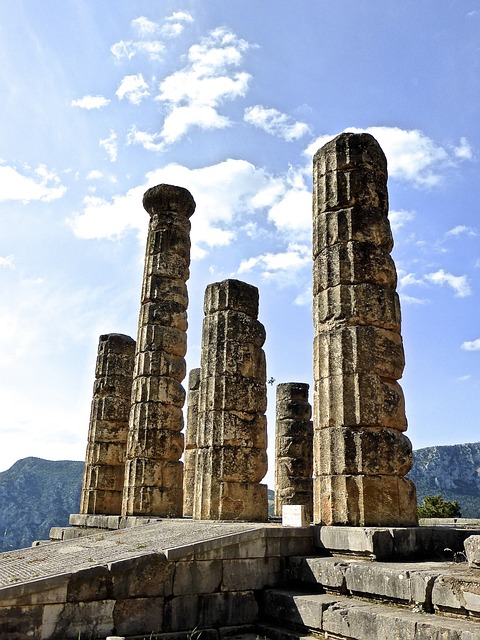When the main pillar was discovered in the 19th century, a butcher had been using the capitol slab, the only unburied part, as a cutting board. Think of all those bloodied meat cleavers, the carcasses of slaughtered bulls over fine marble, the iron-rich red seeping into the Panhellenic soil below, a soil that for centuries described the history of sacrifice. Perhaps the butcher in question each time said a little prayer to the old gods, or (and this is more likely) to God, and while his actions were temporally displaced, they were unwittingly sacred; the blade of his knife like a blush of curiosity (were they watching from above?), his blessing lacked a priest’s solemnity, yet wasn’t irreverent.
I like to think that his butchery might have assumed something of the same form as ancient sacrifice, akin to carved heads, bronze hands, swords, shields, votive offerings left at the base of an idol, where in each case there would have been a genuine instance of supplication, humbling oneself before Athena, or Artemis, or the Fates, as the case may be. That when drew his blade it wasn’t to brandish it, but to carve so precisely, so intimately, and with such focus at the joints’ sinews that his edge would never dull. That he might consider how his family would take on the substance of the animal, in the way devotees might have been fortified by the hopes of the gods.
Yet who knows.
Perhaps he smiled in self-satisfaction, pleased with his workmanship, as he turned towards home and chopped and wiped his blade—or did his eyes roll back in his head, this apprentice, not chanting to himself of tomorrow, but whispering above lofty human aspirations, sensing before him the sculpted Doric pillar that had survived the earthquakes, shielded by the earth? Or was this a cold gesture, a series of trials with a blunted instrument, his meal another chapter in a butcher’s log, paired with figs cut length-wise, whether by a priest or butcher, or oracle—could he have sensed the calm energy of the knowing stone?
Some questions probably are cursed—or if that is an exaggeration—some questions are better to leave aside, like the ones I thought about when surmounting Mount Parnassus. I’d say this to travelers: don’t go it alone. You can climb up and up the concentric path at midday, thinking of the butcher’s slab, the old donkeys that must have hauled all the excavation gear in the 19th century, you can convince yourself that eventually Pan’s cool cave quench will come (so the locals had said)—only to find yourself repelled by horned steers and the farm dogs who protect them.
It didn’t make sense to my rational brain that there could be a mountaintop farm. And since this was Greece, it was hard to find any trail blazes I might have missed. Backtracking, the blood beat between my eyes, throbbed my eardrums the whole long way down. The only saving grace was a bottle of water some good soul had left at a chapel on the top of the mountain. Oddly, I found myself thinking less about the shaking mechanics of my body, whether some headline would read ‘stupid tourist succumbs to heat exhaustion’, and more about the problem of suffering—how I always thought there might be an answer, some theologian who digs in his heels and convinces everyone of the strange fact that since there is suffering, this world must not be real.
This world must not be real, my thought-train muttered to itself, or God would not have allowed it—it must be among the merely possible worlds. In the bright air of Parnassus it is harder to imagine instances of suffering, I mean yes you can—you do as you sweat, yet they evaporate almost as quickly as they form, seem somehow like the idle thoughts of God, beads rolling down your temples. It’s as though the real stuff were stored up in the omphalos that is the navel of the earth. I had seen it the previous day. Fitted with a heavy lid entwined by roots of laurel and oleander whose tendrils know its echoing mysteries, the Delphic injunction to ‘know thyself’ which I had always believed implied testing your limits, going beyond yourself even if that meant taking only one more step.
I stooped down to pick up a bent iron nail with a square head, maybe fallen off some pack animal chomping at the bit.
If this world isn’t real, no one can unseal it.
When I came back down the mountain, I drank more water than ever in my life. I wanted nothing else. I prayed to no one, although I had been spared. I put the nail on the nightstand and wondering if it was Roman, cranked up the AC and buried my forehead in the cool of the mattress. I let history’s reimagining rest.
***
Our friends at Corporeal Writing are reinventing the writing workshop one body at a time.
Check out their current online labs, and tell them we sent you!
***
